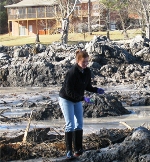After seven years, San Francisco's Planning Commission certified the project's environmental impact report for work that is designed to improve Bay Area water supply in the Alameda Creek habitat.
The revised specification is open for comment until March 21.
As a first step, the organizations will combine forces at the April Water Matters! Fly In.
Twenty-nine legislators supported bills in the House and Senate that would remove some authority from the Department of Ecology and set up a new water commission.

Five areas are threatened by impacts related to energy production, from offshore drilling in Alabama to mountaintop removal coal mining in Tennessee to 'fracking' in Virginia.
The free webcast on "Nitrogen and Phosphorus Pollution and Harmful Algal Blooms in Lakes” is scheduled for Jan. 26.
Billfish and tuna, important commercial and recreational fish species, may be more vulnerable to fishing pressure because of shrinking habitat according to a new study.
EPA seeks abstracts for presentations; deadline is Jan. 14.
Underwater vehicles will be used by Woods Hole Oceanographic Institute and other university scientists to learn if the Deepwater Horizon oil spill affected animals in the Gulf of Mexico; the public is invited to take a look via the Dive and Discover website.
Flammable and bubbling drinking water was coming out of taps at two residences near Fort Worth, Texas; EPA testing found methane and benzene.

Current water quality monitoring looks only at the surface, according to Avner Vengosh, Duke professor of geochemistry and water quality.

Grassroots campaign engages artists and people across the globe to deepen understanding of possible climate change effects.

Study shows pollutant levels in soil collected from Mount Everest glacier were acceptable for most trace elements; arsenic and cadmium exceeded drinking water standards.
Pilot plant will help identify best ways to purify Hudson River water.
The microsite shares information related to the identity and common uses of the additives and constituents generally involved in the hydraulic fracturing process.
EPA's nutrient criteria rule is set to be finalized Sunday; recently elected Florida leaders want more time to analyze the rule's effect on residents.
The Fertilizer Institute and other agricultural groups are urged senators to stop S. 1816 because of its precedent-setting language.
Nearly two-thirds of those surveyed say they’re willing to pay more now to ensure long-term access to clean water.
Texas Tech researcher Moira Ridley said her experiments with strontium and nanoparticles of titanium dioxide revealed subtle differences depending on particle size.
The 25-year plan advances potential future contingency resources, such as stormwater capture and seawater desalination.